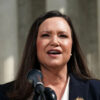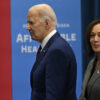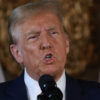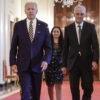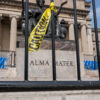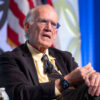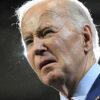What did the President know and when did he know it, goes the old Washington adage. Thus did the American people learn yesterday in separate but equally startling revelations that the Obama Administration knew more about two scandals than it has been revealing. The first is regarding the Operation Fast and Furious gun running disaster and the second is the now-bankrupt, Obama-backed Solyndra solar power company. Both instances provoke serious questions for the White House and demand long-overdue action.
In the case of the Solyndra scandal, it is clear that Congress must shut off funding for the President’s green energy programs. Not only is President Obama unapologetic about the wasted funds, but his Energy Department seems intent on doubling down with other solar bets–and with the American people’s money.
In the case of Fast and Furious, Department of Justice (DOJ) memos obtained by CBS News show that Attorney General Eric Holder was aware of a controversial cross-border law enforcement operation in July 2010 — nearly a year earlier than he had previously acknowledged under oath in testimony to Congress. The program, which was overseen by the DOJ, launched an effort to sell weapons to small-time gun buyers in the hopes of tracing them to major weapons traffickers along the southwestern border and into Mexico. Of the 2,000 weapons sold, roughly 1,500 remain unaccounted for, and the weapons have been connected to at least 11 violent crimes in the United States, including the killing of a border patrol agent.
Testifying before the House Judiciary Committee in May 2011, Holder said that he had “probably heard about Fast and Furious for the first time over the last few weeks.” CBS News notes that the pair of memos “directly contradicts [Holder’s] statement to Congress.” Heritage’s Lachlan Markay reports:
On July 9, 2010, Michael Walther, director of DOJ’s National Drug Intelligence Center, briefed Holder on Fast and Furious, which he mentioned by name, according to one of the memos. The operation “involves a Phoenix-based firearms trafficking ring,” Walther wrote, and an unidentified number of “straw purchasers,” who “are responsible for the purchase of 1,500 firearms that were then supplied to Mexican trafficking cartels.”
Four months later Assistant Attorney General Lanny Breuer, who heads DOJ’s criminal division, informed Holder of eight arrests relating to Fast and Furious, which he also referred to by name.
“The Justice Department told CBS News that the officials in those emails were talking about a different case started before Eric Holder became Attorney General,” the network reported. “And CBS News reported that Holder misunderstood that question from the committee — he did know about Fast and Furious — just not the details.” Heritage Senior Legal Fellow Hans von Spakovsky says, “This raises serious questions about Holder’s credibility and whether or not he provided accurate information to Congress.”
Then there’s the case of Solyndra, the company that received a $535 million government-backed loan to produce solar panels, then went bankrupt. President Obama visited the company in May 2010 and hailed it as “a testament to American ingenuity and dynamism,” using it as a showpiece of his “green” jobs initiative. Since the company’s bankruptcy in September, questions have been raised about the propriety of the loan and the process by which the Obama Administration is picking winners and losers in the marketplace.
In a new development, e-mails released Monday show that President Obama received advanced warning about the company’s financial condition and pleas that he reconsider visiting the company in order to avoid political embarrassment. The Washington Post reports on the exchange:
“A number of us are concerned that the president is visiting Solyndra,” California investor and Obama fundraiser Steve Westly wrote to Obama senior adviser Valerie Jarrett in May 2010. “Many of us believe the company’s cost structure will make it difficult for them to survive long term. . . I just want to help protect the president from anything that could result in negative or unfair press.”
Yet despite the warnings about the company’s financial condition, the Obama Administration went ahead with the loan, putting 535 million taxpayer dollars at risk on a venture that had red flags all over it.
Remarkably, in an interview yesterday with ABC News, President Obama defended his Administration’s backing of Solyndra, saying “hindsight is always 20-20” and that Solyndra “went through the regular review process and people felt like this was a good bet.”
This, though, was not even a question of hindsight, but of sheer stubbornness in the face of contrary evidence. As the e-mails reveal, the White House had the benefit of foresight–advance warning that the company was on shaky ground. But the e-mails weren’t even the only warnings. The Wall Street Journal reports that “by late 2010, Solyndra ran into such severe cash problems that it violated terms of its loan, and the government restructured its agreement in a way that allowed private investors, who agreed to provide a $75 million loan, to be paid ahead of the U.S. if the firm was liquidated.” Yet despite all this, the President went ahead and put taxpayer dollars on the line.
Both Operation Fast and Furious and the Solyndra investment raise serious questions about the Obama Administration. In the case of Fast and Furious, it is now clear that Attorney General Holder and the DOJ have not been forthright with the American people. It’s time they give the country a full accounting of the operation, its knowledge of it, and why they have not been forthcoming.
As for Solyndra and the President’s green jobs gambit, there is certain clarity that the Administration’s strategy of backing companies that can’t stand on their own two feet is a failure. Congress should cut off funding for the President’s green energy programs, regardless of whether the President wishes to see the writing on the wall.
Quick Hits:
- Islamist militants detonated a truck bomb in Somalia’s capital Mogadishu on Tuesday, killing at least 70 people and wounding dozens others. The al-Qaeda-linked group al-Shabab immediately claimed responsibility.
- Global stocks took another tumble this morning amid continuing fears over a default by Greece, which in turn could lead to a major banking crisis in Europe, resulting in a global economic slowdown.
- The Senate voted yesterday to advance a bill that would punish China for its currency policy. Though there are serious issues in the United States’ economic relationship with Chinas, Heritage’s Derek Scissors explains that the bill won’t address any of them.
- Jury selection begins in the case of Abdul Farouk Abdulmutallab, the man who attempted to blow up a Northwest Airlines flight as it approached Detroit in 2009.
- U.S. taxpayers are on the hook for a new United Nations building in New York City. Early estimates say the building will cost $400 million, but that number could go much higher.

